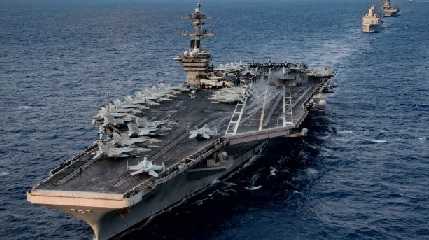
by Anadolu Agency
With the Israel-Hamas conflict nearing its third week, the US has taken a clear stand as a steadfast ally of Israel, offering both political and military support.
It has played the same tune as Israel when it comes to a ceasefire in the Gaza Strip, which has been pummelled by Israeli bombs that have now killed more than 7,000 Palestinians, including over 2,900 children and more than 1,700 women.
At the diplomatic level, it has opposed resolutions calling for a ceasefire, pushing, instead, its own proposals for temporary “humanitarian pauses”.
On the military front, the support has ranged from arms and ammunition, to consultancy from top-level commanders.
"We are definitely seeing very strong support from the US to Israel focused on the Israeli objective of eliminating Hamas" Merissa Khurma, the Director of the Middle East Program at the Washington-based Wilson Centre, told Anadolu.
READ: UN: Prior to war, Israel siege of Gaza left 80% of Palestinians dependent on aid
She said Israel is already the largest recipient of US foreign aid, with primary focus being on defence and military assistance. Annually, Israel receives nearly $4 billion in defence aid from Washington.
According to her, President Joe Biden’s administration has already sent the “USS Gerald R. Ford” carrier strike group to the Eastern Mediterranean and another one is on the way.
Each of these carriers has more than 70 aircraft on board with considerable firepower, she said.
“The Biden administration also placed thousands of troops on standby … ready to move in the region if things escalate,” she added.
According to Murat Aslan, a defence expert at Turkish think tank, Foundation for Political, Economic, and Social Research (SETA), US military aid to Israel is “security assistance” and a “one-way commitment”, with no expectations of financial compensation from the other side.
Along with weapons, the US is also providing intelligence assets and consultation by experienced commanders of the US military, he added.
Arms and advice
According to the official X account of Israel’s Defence Ministry, the country, last week, received its 45th cargo plane from the US, carrying 1,000 tons of armaments.
Additionally, the US contributed by sending a cargo shipment of armoured vehicles to replace those damaged in the conflict.
According to Aslan, the kind of weapons coming from the US would depend on the type of operation that Israel could be planning, particularly the expected ground offensive on the Gaza Strip.
“They have to clear obstacles. They have to move fast and they have to be prepared for booby traps, improvised explosive devices (IEDs) and also snipers,” he told Anadolu.
In this sense, the US is expected to provide ammunition and equipment that could help destroy the obstacles and neutralise the snipers.
READ: Algeria and Tunisia condemn Macron’s call for coalition against Palestinian resistance
For infiltration into Hamas tunnels, the Israeli army would likely use bombs that can be dropped by air and can drill into the ground before exploding, said Aslan.
According to recent reports, the Israeli government is contemplating the use of nerve gas and chemical weapons, assisted by US forces, in the tunnels.
Defence companies in the US are also expediting weapons orders for Israel, most of them munitions for the Iron Dome air defence system, says the Times of Israel.
The Ford aircraft carrier also has the ability to launch surveillance planes and can help alert about missile launches.
The US is also deploying aircrafts at its military bases in the Middle East, ordering more warplanes to support its existing A-10, F-15 and F-16 squadrons at these bases.
According to media reports, Defence Secretary, Lloyd Austin, had announced that the US is assisting Israel with intelligence and planning, and providing advice and consultations to its military.
Khurma said that multiple American defence officials have already been in Israel, and there is very close coordination and channels of communication on a daily basis.
Biden, who visited Israel last week, was also briefed on Israeli military plans, she added.
Direct US involvement in Gaza ground offensive
Both experts, however, ruled out direct American involvement in the looming ground operation in Gaza.
According to Khurma, that remains very much an IDF plan.
“But if US targets are also hit, then you may see the US being involved, particularly in Lebanon, but I do not see the US being involved with ground troops in Gaza,” she said.
According to Aslan, the US will be closely observing what happens on the ground in Gaza.
"I don’t think that they want to be involved in it. Iraq and Afghanistan offered lessons for the US military and, once they enter a war in the Middle East, they can’t step back. This is the reality" he said.
On the Israeli hostages held by Hamas, Khurma said the US is working with allies in the region, primarily Qatar and Egypt, who have channels of communication with the Palestinian group.
She said there will be no cease-fire call from the US until Hamas releases the hostages.
According to Aslan, there are two ways to resolve the hostage issue.
The first one is diplomatic, with Qatar playing a prominent role in this, which is why Hamas is releasing some for the sake of having some aid for the civilians, he said.
The second one is the military option, but those are always risky and can result in civilian casualties, he added.
“The purpose for Hamas on the morning of 7 October, was actually this; taking hostages just to start a negotiation process when the conflict escalates,” said Aslan.
“If there is another military escalation, through either land operations or infiltrations by special operations units, I think we will find ourselves in another deadlock.”
This content was published in Middle East Monitor on October 26, 2023. To restrict the overall size; some images may have been excluded.
Opinions expressed in this article are the author's own and do not necessarily reflect the views of UMMnews.




